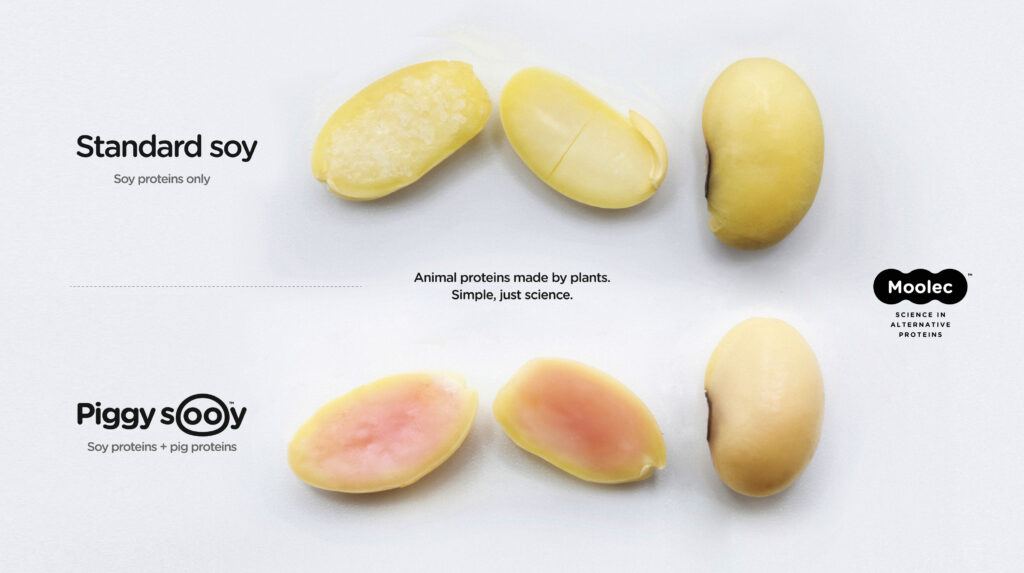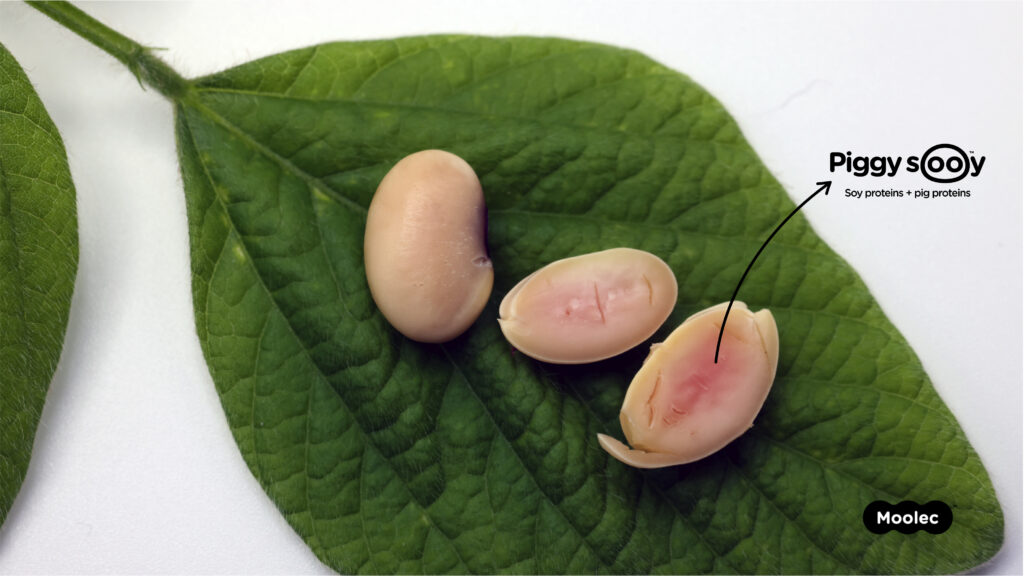In the world of agriculture and biotechnology, innovation knows no bounds. One such groundbreaking development has emerged from the labs of Moolec, a startup that is pioneering the concept of “molecular farming.”1 This innovation takes the form of “Piggy Sooy,” a remarkable soybean variety genetically engineered to produce animal proteins, specifically pig proteins.2
Moolec’s revolutionary approach promises to transform the production of animal-free meat alternatives and addresses critical environmental and ethical concerns associated with traditional animal farming. In this comprehensive exploration, we will delve into the fascinating world of Piggy Sooy, citing insights from two primary sources that shed light on this groundbreaking development.
The Birth of Piggy Sooy: Soybeans with a Porcine Twist
Moolec’s “Piggy Sooy” soybean is a testament to the power of genetic engineering, pushing the boundaries of what is possible in modern agriculture. If you were to cut open a “Piggy Sooy” soybean, you would be met with a surprising sight – a vibrant pink interior, a visible testament to its unique genetic makeup. This innovation represents the fusion of soy DNA with pig DNA, creating a soybean plant capable of producing animal proteins. According to Gastón Paladini, CEO and co-founder of Moolec, this technology effectively replicates what nature does within an animal but accomplishes it within a plant.
Molecular Farming Piggy Sooy
At the core of Moolec’s innovation is a methodology referred to as “molecular farming,” which offers an environmentally friendly and cost-effective alternative to traditional meat production methods. Unlike cell-cultivated meat, where animal cells are grown in controlled environments, molecular farming leverages the natural growth processes of plants. This approach involves tweaking the soybean plant’s nucleus through genetic engineering so that it can produce proteins found in animals. Importantly, these soybeans can be grown on conventional farms, making this method highly scalable and sustainable.
Moolec’s technology focuses on modifying the soybean seed itself, making it compatible with existing agricultural infrastructure. This innovation opens the door to achieving price parity with traditional animal protein while reducing the environmental impact of land use and deforestation associated with soy farming.

The Quest for Authentic Plant-Based Meat
Moolec’s “Piggy Sooy” represents a leap forward in the plant-based meat industry by offering a more authentic meat substitute. Unlike other plant-based alternatives that require numerous additives, “Piggy Sooy” provides a purer protein source that closely resembles animal proteins. This similarity in protein composition is expected to make “Piggy Sooy” a convincing option for meat lovers looking to transition to plant-based diets. Several other startups, including Nobell, also adopt a similar approach to create animal proteins, illustrating the growing trend in this space.
Scaling Up Piggy Sooy: The Road Ahead
Moolec has already demonstrated the viability of its “Piggy Sooy” platform, achieving soybean seeds with a remarkable 5% to 26.6% porcine protein content. This achievement surpasses their initial expectations and marks a milestone on the path to commercial viability. The company is now focused on scaling up production for further testing while concurrently developing protein powders extracted from these soybeans for sale to food producers. Moreover, Moolec is exploring the production of additional proteins for pork and beef, with each soybean variant specializing in one specific protein. The first products are anticipated to reach the market within four to five years.

Moolec’s Global Reach with Piggy Sooy
Moolec’s impact extends beyond the lab and into the global agricultural landscape. Presently, the company operates molecular farming operations in the United States, Europe, and South America. This geographical diversity showcases Moolec’s commitment to making its innovative technology accessible globally.
Conclusion
Moolec’s “Piggy Sooy” represents an advancement in molecular farming and the plant-based meat industry. By ingeniously integrating pig DNA into soybean plants, this startup is poised to revolutionize the production of animal-free meat alternatives. Not only does this approach offer a more sustainable and affordable solution compared to traditional meat production methods, but it also provides a more authentic plant-based meat experience. As Moolec continues to scale up production and develop a range of protein powders, the future of plant-based meat looks brighter than ever.
The convergence of genetic engineering, agriculture, and sustainability embodied by Moolec’s “Piggy Sooy” may present a more ethical and environmentally responsible way of meeting the world’s growing demand for protein.
Keep Reading: Environmental groups relieved as release of GE mosquitoes avoided in California
Sources
- “Scientists just invented a soybean that tastes like pork.” Fast Company. Adele Peters.
- “Transgenic soybeans could replace pork, by producing pig proteins.” New Atlas. Ben Coxworth. June 30, 2023

